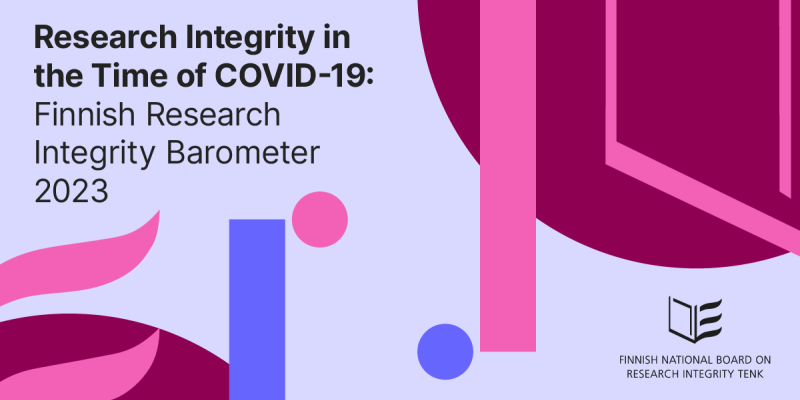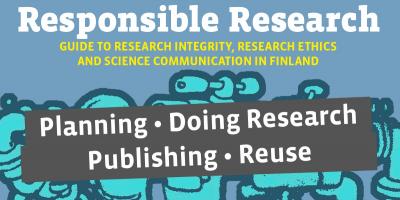The importance of ethical matters is constantly increasing in EU programmes funding research and innovation.
Research ethics are not merely research formalities; instead, they are a part of guaranteeing a high quality of research. Ethical matters are a high priority in European Union’s Horizon 2020 programme providing funding for research and innovation, and they will become even more important in the next Horizon Europe programme.
The European Commission, the party executing the programme, has a clear view about the importance of ethical matters. The Commission finds it essential that careful ethical evaluation is performed already in the application phase in order to ensure the quality of research in the projects and that legislation and rules governing research are respected.
The requirements themselves have existed for a long time, but after the initial phases of Horizon, the Commission introduced a practice of adding an ethical work package in all projects receiving a positive financing decision. This caused something of a panic, even though the Commission only wanted to control ethical matters properly.
The Commission introduced a practice of adding an ethical work package in all projects receiving a positive financing decision.
Ethics is understood widely in the Horizon 2020 programme. In addition to good scientific practice and the reliability of research, ethical issues cover everything that helps ensure the observation of any legal requirements governing research. Such requirements concern stem cell research, invasive studies and studies concerning children or animals, among others. But the the list does not end here. Ethical evaluation also includes matters related to security, personal data, cooperation with countries outside the EU, the environment and projects developing innovations that can be used for military purposes.
Observation of ethics in the application process
The consideration of ethics has been made as easy as possible for the applicant. The commission has facilitated the ethical considerations of the applicant: all applicants independently complete an ethics self-assessment using a table created by the Commission. The questions included are quite detailed. The only way to fail is actually through negligence, and ignoring ethics is definitely bad news for the application. All funding applications that make it to a certain level in the evaluation and on the list of proposals for possible funding will be subjected to a more detailed ethics screening led by the Commission. There may even be an additional ethics assessment if some aspects of the study design require this.
Ethics experts or an ethics panel of the Commission prepare a report about the application and give one of three proposals: cleared, conditionally cleared (corrections required) and cancelled. Neglecting ethical matters may even lead to not granting funding for a project that would otherwise be eligible for funding, because the Commission will not sign the grant without an approved ethical screening.
Neglecting ethical matters may even lead to not granting funding for a project that would otherwise be eligible for funding,
In the current Horizon 2020 programme, ethical requirements are stated in the rules of participation, whereby the process is described in two short chapters under Article 14. Ethical obligations are also highlighted in Article 34 of the Grant Agreement (preconditions for funding).
The new ethics work package that I mentioned before was only introduced a couple of years after the beginning of the framework programme. This meant that the control over ethical matters became substantially stricter. This development did not end here.
Horizon Europe
The framework programme following the Horizon 2020 programme is currently being prepared. This ninth framework programme is called Horizon Europe. The space taken up by ethical matters has increased noticeably in its legal text drafts.
In the legislative level participation rules of Horizon Europe currently in the draft phase, ethical matters have been clearly elevated to a higher level in terms of legal effect. In addition to national and international legislation, the observation of the European Convention on Human Rights has been included as mandatory obligation, for example.
If ethical matters have already been addressed adequately, this does not require any additional changes. It is, however, a good opportunity to check how fluently and responsibly the ethical matters related to research have been arranged in ones’ own organisation.
Liisa Ewart, Horizon 2020, National Contact Point (NCP) for Legal Issues
Further information:
European Commission: Participant portal H2020 Online Manual: Ethics http://ec.europa.eu/research/participants/docs/h2020-funding-guide/cross...
European Comm15ission: How to complete your ethics self-assessment. http://ec.europa.eu/research/participants/data/ref/h2020/grants_manual/h...
You might also be interested in
Tämä teos on lisensoitu Creative Commons Nimeä 4.0 Kansainvälinen -lisenssillä. Detta verk är licensierat under en Creative Commons Erkännande 4.0 Licens. This work is licensed under a Creative Commons Attribution 4.0 International license.


